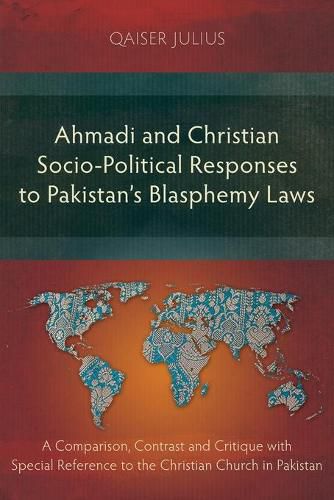Readings Newsletter
Become a Readings Member to make your shopping experience even easier.
Sign in or sign up for free!
You’re not far away from qualifying for FREE standard shipping within Australia
You’ve qualified for FREE standard shipping within Australia
The cart is loading…






This title is printed to order. This book may have been self-published. If so, we cannot guarantee the quality of the content. In the main most books will have gone through the editing process however some may not. We therefore suggest that you be aware of this before ordering this book. If in doubt check either the author or publisher’s details as we are unable to accept any returns unless they are faulty. Please contact us if you have any questions.
The roots of Pakistan’s blasphemy laws can be traced back to the British colonial rule in India, but their harsher clauses were added to the Pakistan Penal Code during a wave of intense Islamization in the 1980s. Everyone in Pakistan is threatened by the misuse of these laws, even Muslims; however a disproportionate number of victims targeted by these laws have come from two minority groups, the Ahmadis and Christians.
Dr Qaiser Julius focuses on how these two groups have been affected by Pakistan’s blasphemy laws, their different reactions to these laws, and more specifically, why they are responding differently despite living under the same circumstances. In this well-structured and understandable study, Julius provides a valuable tool for Christians to understand what it means to be a minority in a hostile culture. This thorough analysis presents a way forward for the Christian church in Pakistan, providing hope amidst the discrimination and persecution.
$9.00 standard shipping within Australia
FREE standard shipping within Australia for orders over $100.00
Express & International shipping calculated at checkout
This title is printed to order. This book may have been self-published. If so, we cannot guarantee the quality of the content. In the main most books will have gone through the editing process however some may not. We therefore suggest that you be aware of this before ordering this book. If in doubt check either the author or publisher’s details as we are unable to accept any returns unless they are faulty. Please contact us if you have any questions.
The roots of Pakistan’s blasphemy laws can be traced back to the British colonial rule in India, but their harsher clauses were added to the Pakistan Penal Code during a wave of intense Islamization in the 1980s. Everyone in Pakistan is threatened by the misuse of these laws, even Muslims; however a disproportionate number of victims targeted by these laws have come from two minority groups, the Ahmadis and Christians.
Dr Qaiser Julius focuses on how these two groups have been affected by Pakistan’s blasphemy laws, their different reactions to these laws, and more specifically, why they are responding differently despite living under the same circumstances. In this well-structured and understandable study, Julius provides a valuable tool for Christians to understand what it means to be a minority in a hostile culture. This thorough analysis presents a way forward for the Christian church in Pakistan, providing hope amidst the discrimination and persecution.